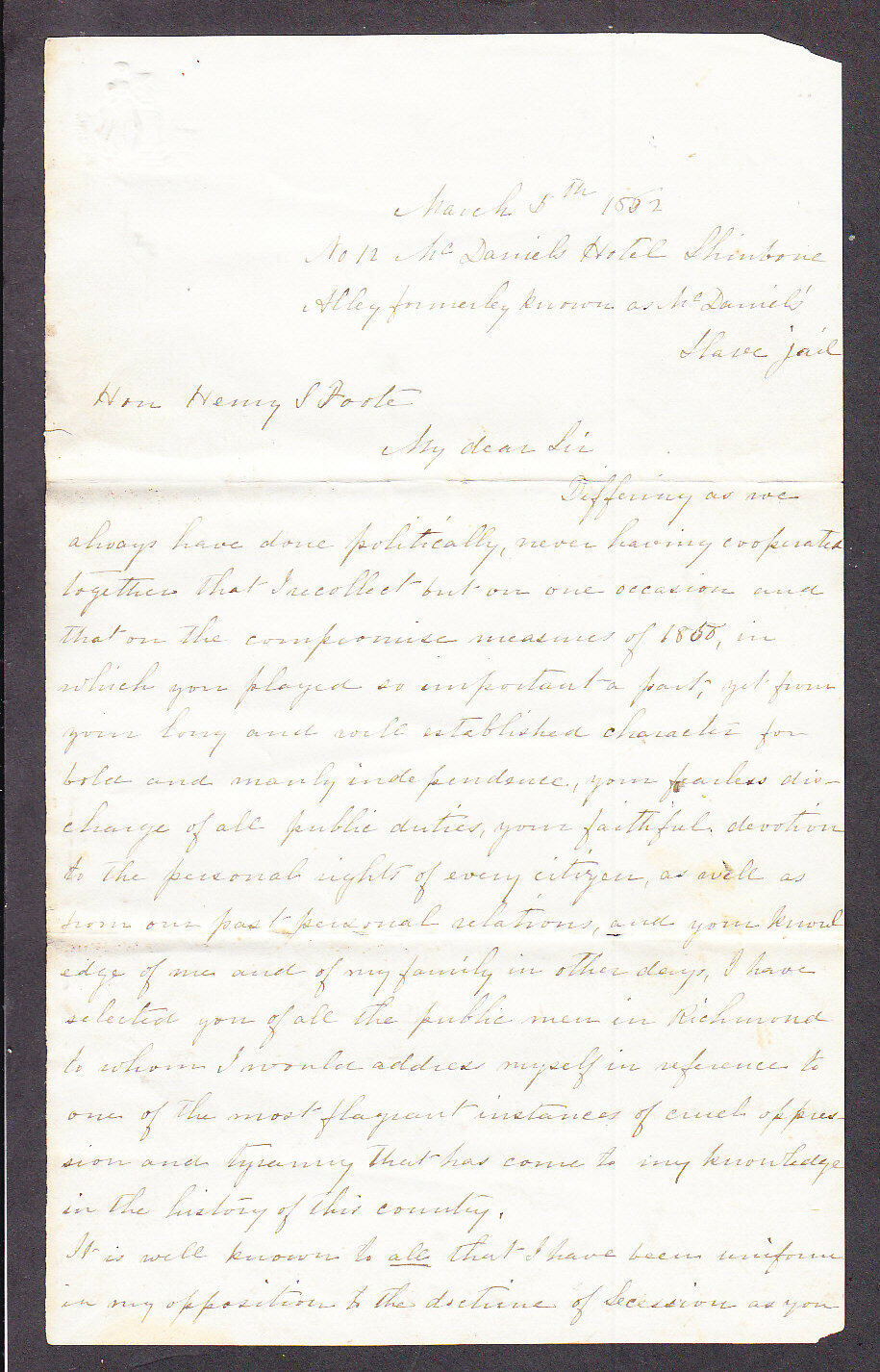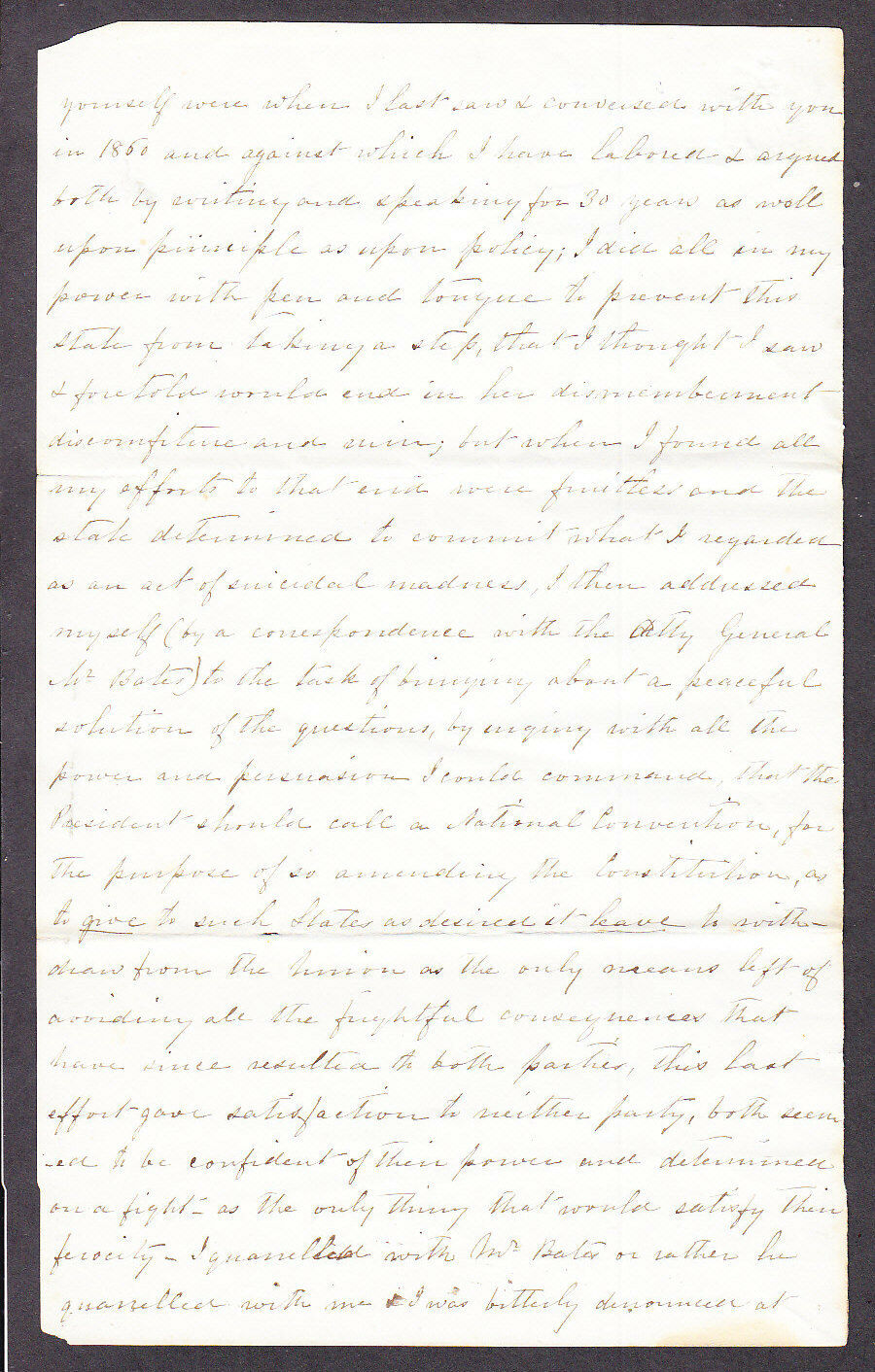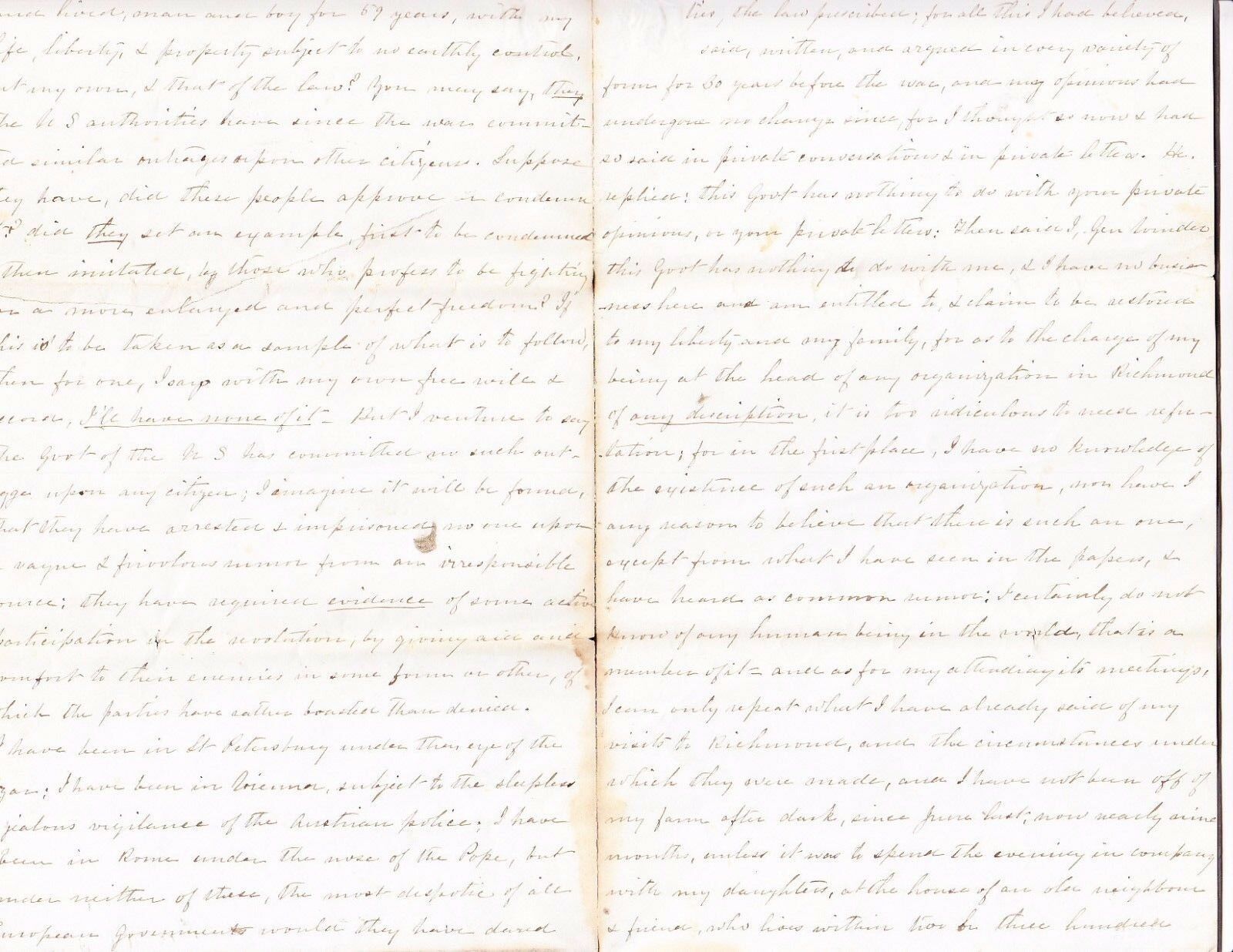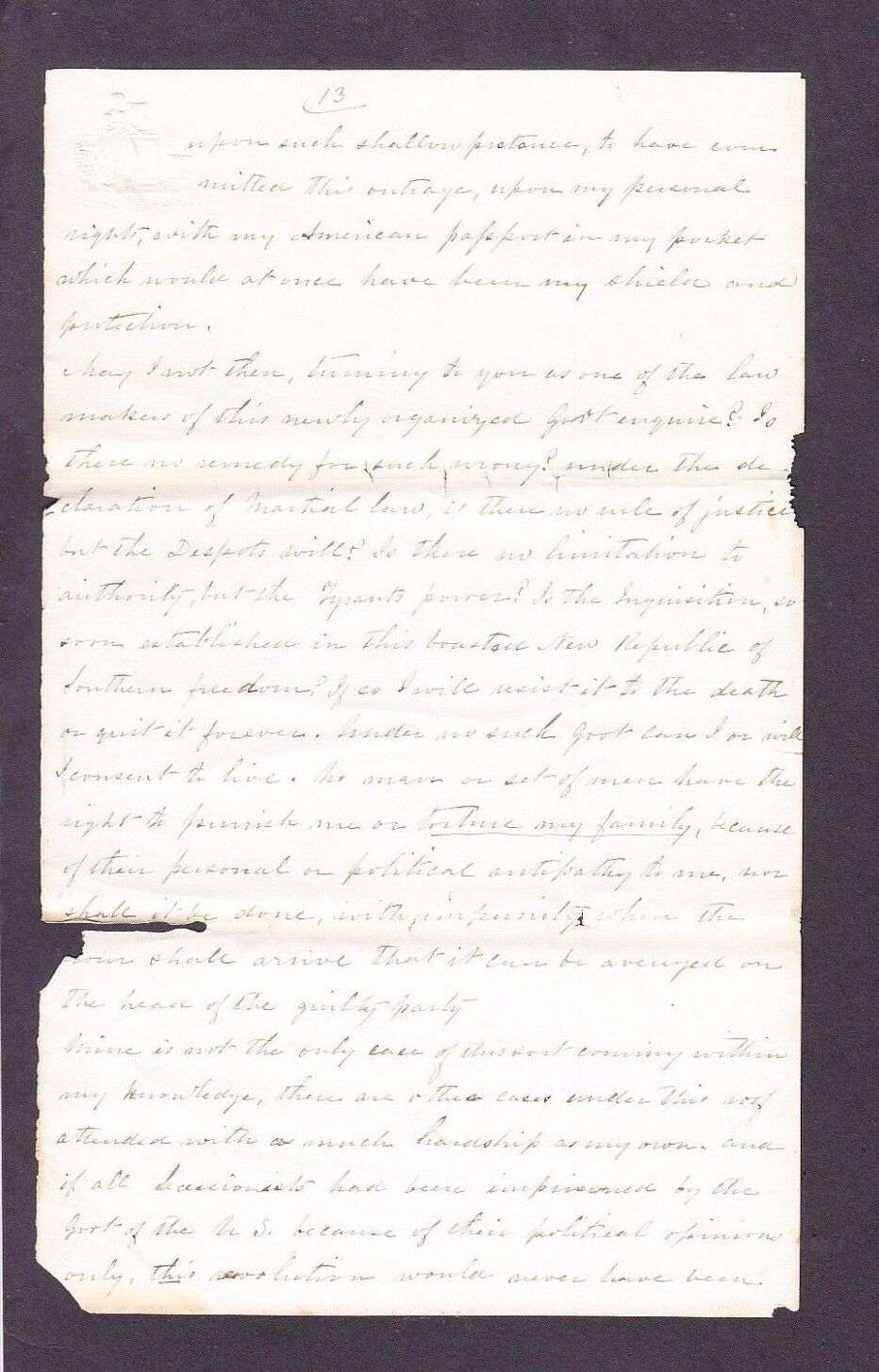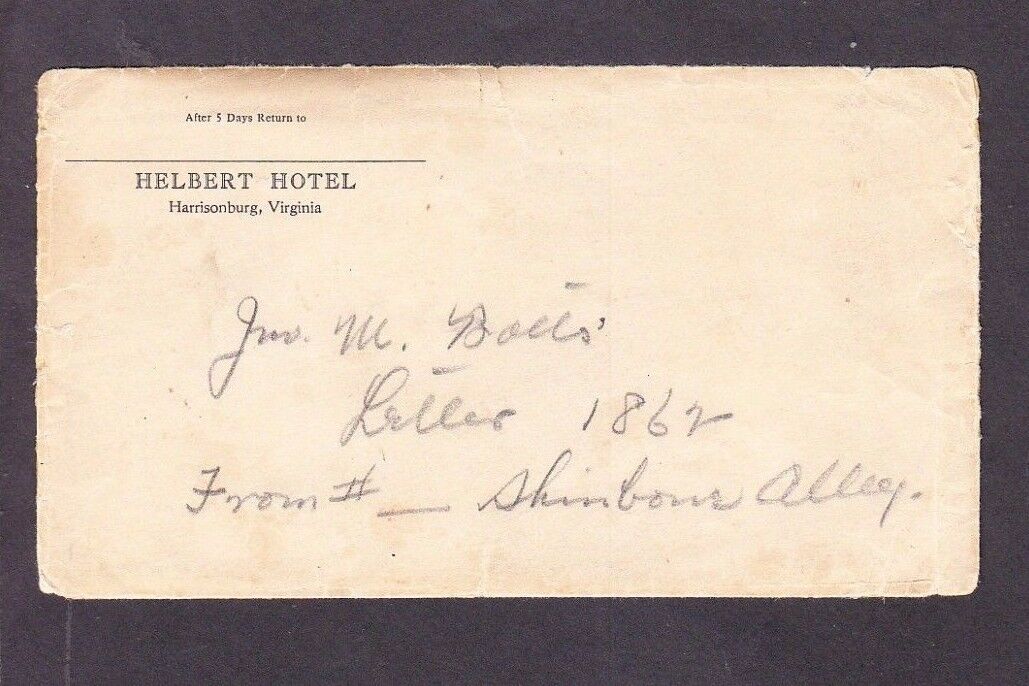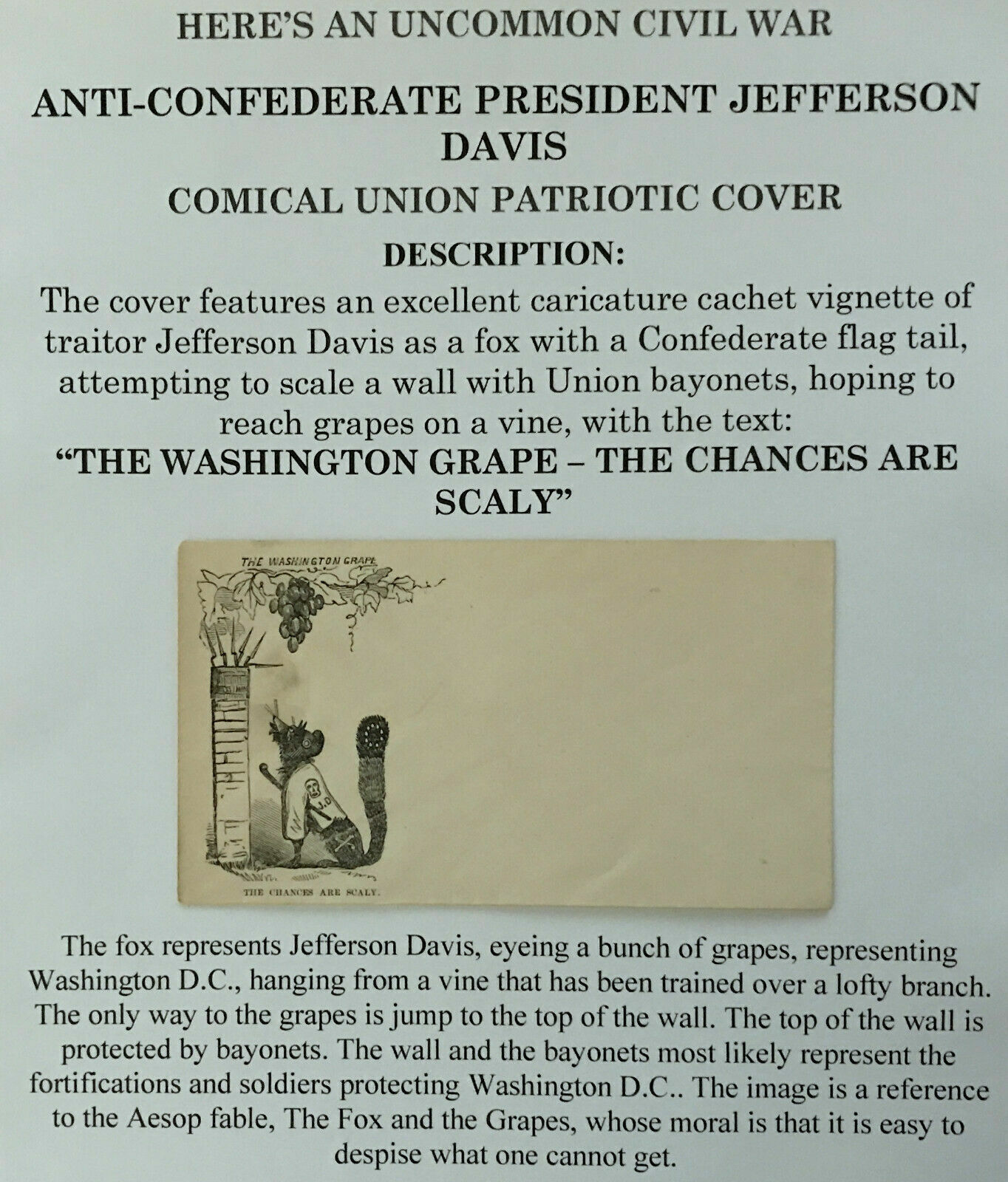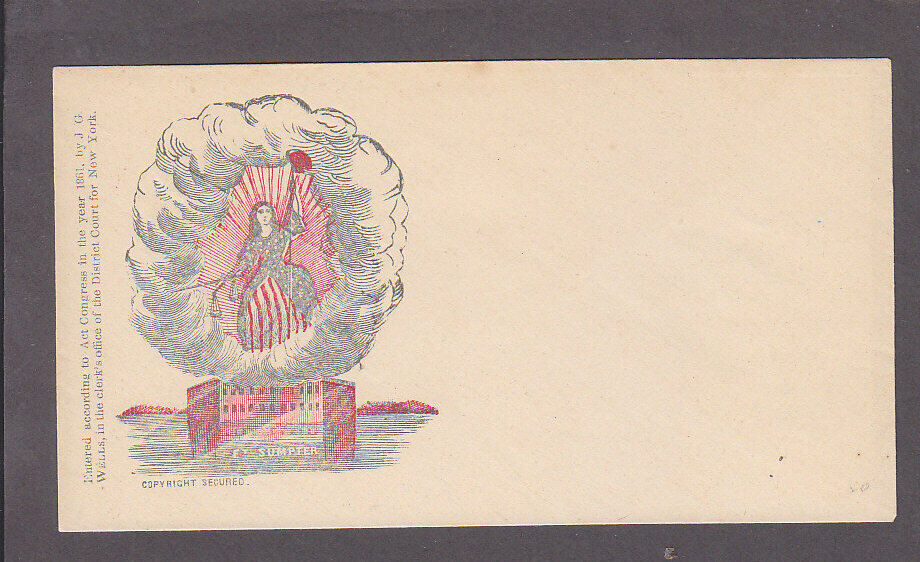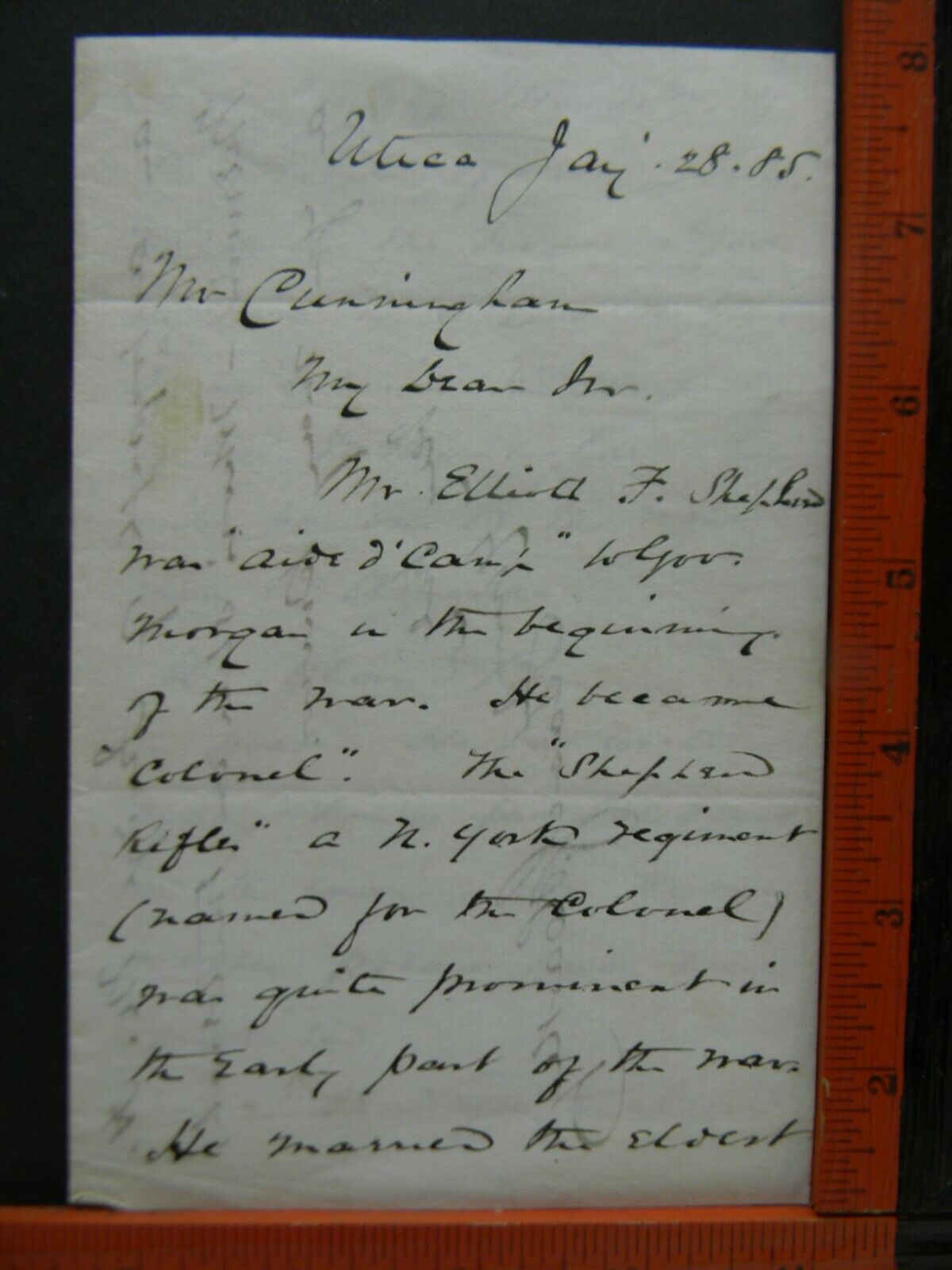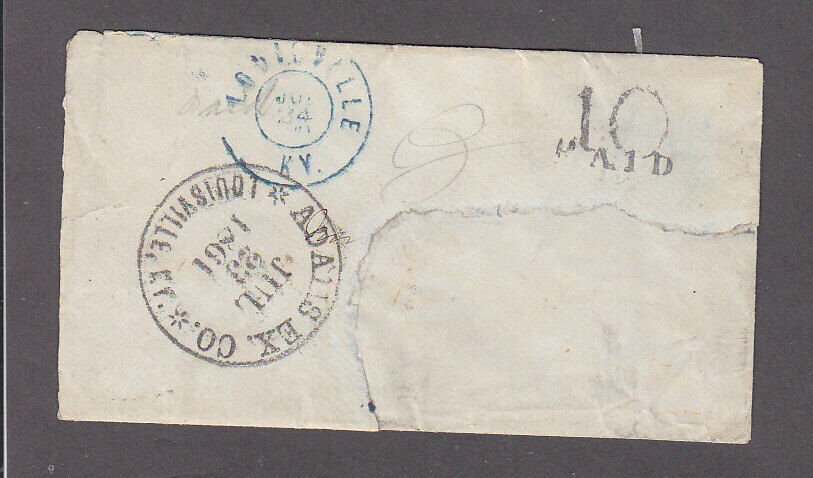-40%
John Minor Botts ALS Political Prisoner Slave Jail Richmond Va Jeff Davis 3/5/62
$ 789.35
- Description
- Size Guide
Description
Civil War letter ALS John Minor Botts, March 5, 1862, No 12, McDaniel's Hotel Shinbone Alley formerly known as McDaniel's Slave Jail. 13.5 pages to Hon Henry J. Foote, in summary, Botts was a staunch Unionist even though he was from Virginia. He apparently said very derogatory things about Jefferson Davis. The Confederate Secretary of War ordered him jailed as a political prisoner in Richmond Va. Bott was writing to his friend, Henry Foote, to ask him to get him out of jail. Davis was the one who ordered Bott's arrest under martial law.Botts writes a flattering commentary on Foote, was always against the doctrine of secession, extraordinary content on his positions in this regards, had tried to help create a peaceful solution to the questions being addressed, amending the constitution, could not get the Confederates to see his point of view, moved to a 50 acre farm, talks about his opinions, mentions his friend, Howell Cobb, who came to see him, reconciled to being arrested and put in prison.
Bott was a political prisoner caused by his enemies who did not agree with his political leanings which is one reason they put him in prison. Talked of his arrrest and being put in a dirty filthy prison house, in a room last occupied by a lot of Negroes, whose bedding had not been moved out or the room swept, was indebted to the kindness of an old servant woman who sympathized with him, apparently gave him her own bed and bedding, a chair and a table, he was able to send home for some conveniences.
He got two meals a day from a restaurant for two days, they told he must feed himself and could not have any visitors, daughters, friends, and legal advisers, he asked for an audience with General Winder that was granted. Told him what he had written in this letter, asked why he was arrested and Winder essentially said for treason, charged with being the head of a large organization in Richmond that met with the purpose of breaking down the Confederate government and known to be hostile to the same government.
He told Winder if he is to be answerable to the government for his private opinions on political subjects, it is an offense to the law to secede from the Union, that secession and revolution were not rightful remedies, knew Franklin Stearns intimately (he was jailed too along with Botts) understands Stearns is a prisoner in this house within 30 feet of us (may mean me).
The above is but a very brief glimpse of Botts thoughts, opinions, and his outrage at being confined. Essentially he was asking Foote to intervene and get him released. I saw a reference to a meeting that Foote called with a committee in the CSA congress to vote on Bott's release. He convinced them to do so as long as he would keep his opinions to himself and not make nasty remarks about the CSA government or write about his opinions which he used to do before the war. The committee voted OK (I have not been able to find the article again but it is out there somewhere).
One of the most extraordinary historically important letters I have ever owned. It should really be in an institution so it could be shared with researchers. To appreciate it, curators, researchers, and private collectors should read every word. Some minor condition issues, mostly some light patina on a few pages, corners nipped, and so on. All evident in the scans.
Full transcript can be uploaded to interested buyers
The article below talks about Bott's arrest and confinement for 6 weeks in a Richmond Va slave jail for speaking out against the war. After Foote received Botts letter (it took six weeks get Bott our of the slave jail), he arranged for a committee in the Confederate Congress to meet and discuss Bott. Foote convinced them to release Bott to his farm as long as he stopped writing incendiary articles and speaking in unflattering terms against Jefferson Davis.
********************************************************************************************************
John Minor Botts(September 16, 1802 – January 8, 1869)
was a nineteenth-century politician, planter and lawyer from VA
He was a prominent Unionist
Botts was born in Dumphries VA to prominent lawyer Benjamin Gaines Botts (1776 - 1811) and his wife Jane Tyler Botts (1782 - 1811).
Botts attempted to unite the Know Nothing party with the new Republican party, but failed to win the support of either as a presidential candidate in 1860. Botts failed to attract sufficient support as a Unionist delegate to attend Virginia's Secession Convention of 1861, although fellow Unionist was elected. President Lincoln met separately with Baldwin and Botts, who later published different accounts of their meetings, neither of which stopped Virginia from seceding. Botts blamed Baldwin for keeping Lincoln's peace offer secret while his native state moved toward secession.
He retired to his Henrico County farm after Virginia declared its secession in the Civil War but continued to write letters to newspaper editors and remained uncompromisingly Unionist in his sentiments.
Through the war, Botts refused to fight against Virginia, but remained in the Commonwealth.
On March 2,1862, Botts and fellow Unionist Franklin Stearns were jailed without trial for expousing Unionist positions after the Confederacy suspended the right of habeas corpus. About 150 people were eventually picked up, and Stearns was later placed under house arrest in his Richmond warehouse, where his family could care for him.
Botts spent eight weeks in solitary confinement. He was released after promising not to publish any more incendiary letters. As stated before this letter described what Botts was doing in the jail and how he wrote to a friend on the CSA Congress to get him out.
FOOTE, Henry Stuart,
a Senator from Mississippi; born in Fauquier County, Va., February 28, 1804; pursued classical studies; graduated from Washington College (now Washington and Lee University), Lexington, Va., in 1819; studied law; admitted to the bar in 1823 and commenced practice in Tuscumbia, Ala., in 1825; moved to Mississippi in 1826 and practiced law in Jackson, Natchez, Vicksburg, and Raymond; elected as a Democrat to the United States Senate and served from March 4, 1847, until January 8, 1852, when he resigned to become Governor; chairman, Committee on Foreign Relations (Thirty-first and Thirty-second Congresses); Governor of Mississippi 1852-1854; moved to California in 1854; returned to Vicksburg, Miss., in 1858; member of the Southern convention held at Knoxville in 1859; moved to Tennessee and settled near Nashville; elected to the First and Second Confederate Congresses; afterwards moved to Washington, D.C., and practiced law; appointed by President Rutherford Hayes superintendent of the mint at New Orleans 1878-1880; author; died in Nashville, Tenn., on May 20, 1880; interment in Mount Olivet Cemetery.
Brigadier–General John H. Winder, C. S. A.
John H. Winder was born in Maryland, where his family had been prominent for many years. He was a son of General W. H. Winder, commanding the American forces at the battle of Bladensburg (luring the war of 1812. General Winder was graduated at West Point in 1820 and assigned to the artillery; he resigned in 1823 but returned to the army in 1827. For a time he served as instructor at West Point, and entered the Mexican War as captain. He was brevetted major for gallantry at Contreras and Churubusco, and lieutenant-colonel for gallantry in the attack upon the City of Mexico. He reached the rank of major in the regular army in 1860 but resigned April 27, 1861. He was soon appointed brigadier-general in the Confederate army and made inspector-general of the camps around Richmond, which included for the first few months supervision of the prisons. He afterward commanded the Department of Henrico, which is the county in which Richmond is situated, and was also provost-marshal-general of Richmond, where his strictness created considerable feeling against him. In 1864, after the largest number of enlisted men had been transferred to Andersonville and many of the officers to Macon, he was placed in charge of all the prisons in Alabama and Georgia. Finally, November 21, 1861, he was made commissary-general of prisoners east of the Mississippi River. He died February 7, 1865, it is said from disease contracted while visiting the prison stockade at Florence. General Winder's character has been the subject of much dispute. To the last, President Davis, Secretary Seddon, and Adjutant Cooper declared that he was a much-maligned man. He was set to perform a task made impossible by the inadequacy of supplies of men, food, clothing, and medicines.
We now offer domestic
FREE SHIPPING
for all Civil War and paper items. Please inquire for any international shipping charges . It depends on to what country. Shipping for these items is our actual cost.
To see all of our listings, click link below
https://www.ebay.com/sch/antebellumcovers/m.html?_nkw=&_armrs=1&_from=&_ipg=50&_sop=1
We suggest you bookmark it so you can easily come back to our listings at any time. If you questions send a question through the eBay system. We have been collecting, doing some part time selling and providing free research and consulting on Civil War memorabilia and Paper Americana for more than 45 years. We are a member of the Manuscript Society, the Confederate Stamp Alliance, and life member of the American Philatelic Society. Good luck bidding!
